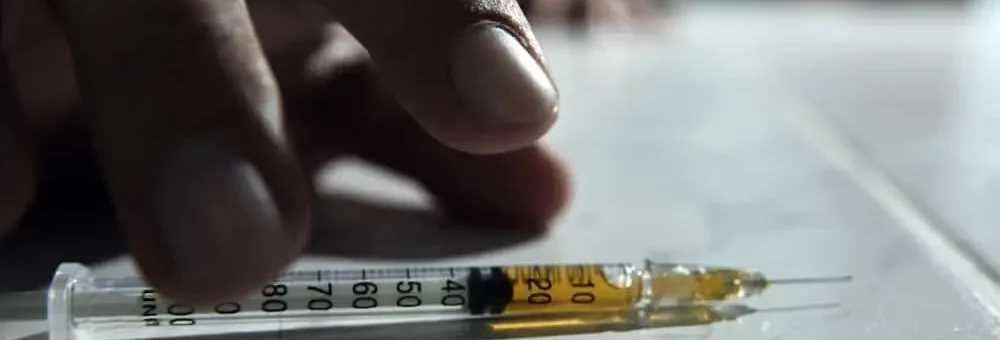
8 Ways to Recognize a Heroin Addiction
Legacy Healing Center Blog
With fatal heroin-related overdoses taking the lives of nearly 130 Americans each day[1], it is no doubt that the opioid epidemic is raging and can touch all walks of life. Nobody wants to find out that their loved one is suffering from heroin addiction, but for many, this becomes a stark reality. If you are unsure whether or not your loved one is suffering from heroin addiction, here are 8 ways you can spot a heroin addiction.
1. Presence of track marks on arms, legs, or neck
One telltale sign of heroin addiction is the appearance of track marks on the body. Track marks can appear suddenly and get progressively worse over time due to repeated injections. Track marks can be as small as a needlepoint, or as large as a several inch long scar. Fresh track marks may appear red or bruised while older, healed track marks typically look like a light-colored scar. Popular places that individuals inject heroin are on their arms, legs, and neck.
2. Loved one is taking frequent, prolonged bathroom breaks
Those who suffer from heroin addiction may take frequent, long bathroom breaks to snort, smoke, or shoot their drugs. In order to hide their addiction to avoid shame and confrontation from friends and family, many addicts will venture to private places to get their next fix.
3. Appearing tired often or nodding out
Heroin is a central nervous system depressant that causes individuals to feel tired and sometimes “nod out”. Since the drug is a type of pain killer, those abusing it may also seem weak, clumsy, and respond slowly. Their pupils may be constricted and they may appear extremely tired and drowsy. When nodding out, the individual may go in and out of a sedated state and simply blame it on a lack of sleep. If heroin is taken in too high of a dose, it can result in an overdose, coma, or even death.
4. Finding drug paraphernalia in the person’s home or personal belongings
Have you found syringes, cotton, spoons, straws, or razor blades in your loved ones home or personal items? If so, he or she may be addicted to heroin. In addition to paraphernalia used to administer the drug, you may also stumble across small bags or vials that heroin is commonly sold in. Finding any of these items is a strong indication that your loved one is addicted to heroin.
5. Loved one is always in a financial crisis or asking for money
Addiction often drives individuals to place their drugs as top priority over their other obligations – including finances. They may miss rent or car payments, rack up substantial credit card debt, or constantly claim to be broke. In addition, a person suffering from heroin addiction may try to manipulate their friends and family into loaning them money. Often times, this need for money may come with a multitude of excuses in an attempt to guilt their loved ones into giving them financial assistance.
6. Sudden weight loss, pale complexion, and sunken in eyes
As heroin takes a strong hold on the mind of an individual, they may begin to neglect their health which can be evident through a variety of physical changes. Their eyes may appear dark and sunken in, their skin may look unusually pale due to a lack of oxygen, and they may experience sudden weight loss from a lack of nutrition. Other physical signs that indicate heroin abuse include excessive itching or scratching, constricted pupils, pale lips, and slowed breathing.
7. Behavioral changes and mood swings
Heroin abuse and addiction can affect an individual’s brain chemistry resulting in behavior and mood changes. A person suffering from heroin addiction may begin to isolate from friends and family, have difficulties at school or work, engage in criminal activities, and display a lack of motivation. In addition, you may notice frequent mood swings, increased depression, and difficulty managing emotions.
8. Coming down with flu-like symptoms from time to time
When heroin isn’t taken, a person who is physically dependent on the drug will experience withdrawal symptoms. Symptoms of heroin withdrawal closely mimic the common flu. These symptoms may include:[2]
- Runny nose
- Constant yawning and sneezing
- Clammy skin
- Goosebumps
- Profuse sweating
- Body aches
- Nausea
- Diarrhea
- Stomach cramps
- Insomnia
- Depression
If your loved one is coming down with these symptoms more than usual, it may indicate that they are addicted to heroin and experiencing withdrawals. During this time, they may appear more irritable than usual and be willing to go to extreme lengths to obtain their next high.
Recovery from Heroin Addiction
At Legacy Healing Detox in Pompano Beach, FL, we understand how terrifying it is to realize that a loved one is addicted to heroin. However, recovery is attainable and the first step is through completing heroin detox. If you notice any of these signs and suspect that your loved one is suffering from heroin addiction, our addiction specialists in Pompano Beach can help them begin on their journey to recovery today.
